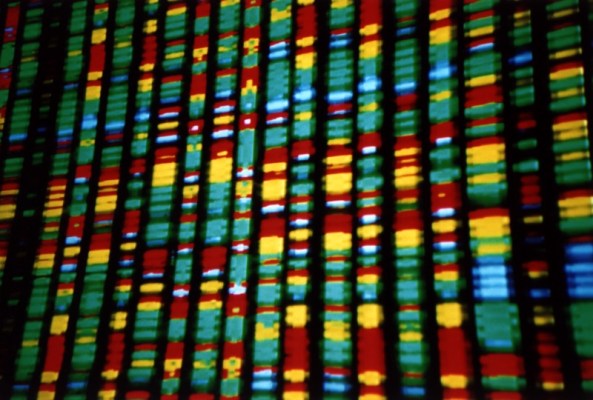Editor’s Note: Christine Magee is an editor for CrunchBase.
Silicon Valley may have coined the ‘big data’ buzzword, but genomic scientists have been working with massive datasets for decades. Due to recent breakthroughs in DNA sequencing technology, genetics is moving from the laboratory into the market, and just about everyone is taking a keen interest.
In January, President Obama requested $215 million to fund his precision medicine initiative — $130 million to back a national research program that will track the data of 1 million volunteer donors, and another $70 million for a National Cancer Institute initiative to identify the genetic drivers of cancer.
Last week, the Bill and Melinda Gates Foundation made its largest investment yet in a $76 million equity round for CureVac, a company using mRNA as a template to make therapeutic vaccines for cancer and infectious diseases.
In 2014, genomic tech companies saw a near 50% rise in number of venture investments recorded while total capital committed more than doubled to reach $687 million last year. Considering that the number of Series A rounds grew by nearly 300% last year, it looks like the funding surge will continue in 2015.
While the majority of these deals are led by biotech investors, a handful of more traditional tech investors have begun to dabble in genomics tech. Consumer genomics startup 23andMe and genomic data management platform DNAnexus have secured funding from well-known tech investors, including Google Ventures, New Enterprise Associates, and First Round.
“I’m a little bit biased because in a prior life I was working on a PhD in biochemistry,” says Mike Abbott, a partner at KPCB who focuses on social, mobile and big data deals. “But if you look at where we are today versus 20 years ago, it’s pretty remarkable — in the last couple of years we’ve really seen significant advances in genomics,” says Abbott.
It’s now possible to sequence a human genome in a single day for $1,000. That breakthrough creates new opportunities for medical testing in areas that had been impossible due to the prohibitive costs of sequencing.
“It took a number of years and over $3 billion to sequence one person’s genomic information back in 2000,” says Amanda Cashin of Illumina, the leading producer of genomic sequencing instruments. “Since that time we’ve reduced the cost so fast for sequencing this information that they call it Flatley’s law, after Illumina’s CEO Jay Flatley,” Cashin says.
Cashin runs the Illumina Accelerator, which offers genomics startups a $100k note from Yuri Milner, $100k in services from AWS, and access to sequencing instruments and lab space. The applications of genomics are vast — startups in Illumina’s 2014 batch range from cancer diagnostics startup Xcell Biosciences to EpiBiome, an agriculture tech company developing treatments to prevent dairy cattle infections.
The enormous potential for genetic applications has created an equally large challenge when it comes to processing, sharing, and analyzing the petabytes of data being generated by cheaper and more efficient machines. In a single year, the most advanced sequencing instruments can sequence 18,000 human genomes, produce three petabytes of data and consume three to five million computing core hours.
“A human genome has 3 billion base pairs — it’s helpful to think of it as 3 billion lines of code. The sequencing instrument reads 50 lines of code at a time, and you have to read each line 30 times,” says Dick Daly, CEO of genomics company DNAnexus. “So you get this giant pile of data, and it’s still largely unintelligible until it goes through a secondary analysis,” he says.
Daly’s company leverages the cloud to build a networked management system for genomic data. As costs for genomic testing have come down, the company has seen a rise in the number of customers storing genetic data on its service.
“Big Pharma is now moving more aggressively into the use of gene sequencing and genomics in drug development, and they’ve sort of hit the wall on their ability to do that without using the cloud,” says Daly. “Up until 6 months ago, almost all of Big Pharma was having people do analysis and then FedEx the physical hard drives, but the limits of that have been reached.”
As genomic testing becomes more mainstream, VCs have a clear advantage, regardless of a science background — bringing new tech to consumers is what the startup world does best.
“The interest that we’ve attracted from the venture community already after our first funding cycle is pretty phenomenal,” says Cashin. “That’s life science investors but tech investors as well — it’s a big data challenge and a lot of folks are jumping into the game,” she says.
